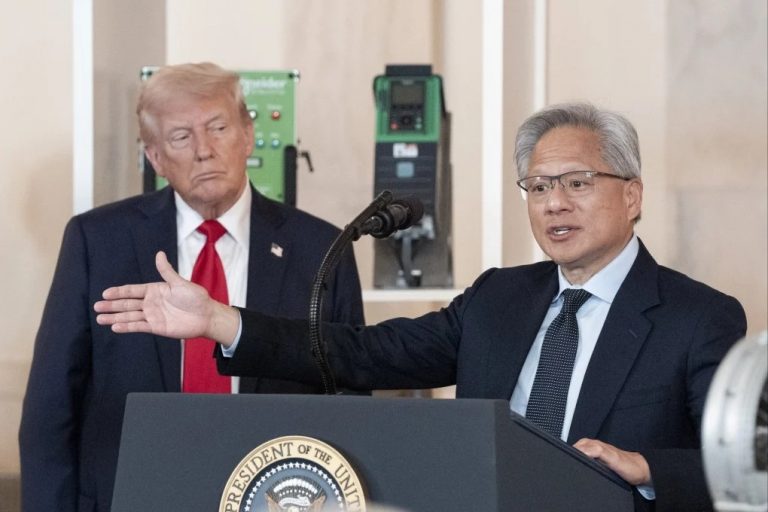
Nvidia CEO Jensen Huang has lauded President Donald Trump’s tech and trade policies as “very visionary,” aligning himself with the administration’s push to re-industrialize the U.S. economy and dominate the global technology race.
Speaking in Norrköping, Sweden, on Saturday, where he received an honorary doctorate from Linköping University, Huang applauded Trump’s sweeping effort to support U.S. technology firms, which has included scrapping Biden-era restrictions on AI chip exports to countries like Saudi Arabia, the UAE, and Sweden.
“The President would like American technology to win with Nvidia and American companies to sell chips all over the world and to generate revenues, tax revenues, invest and build in the United States,” Huang said.
Register for Tekedia Mini-MBA edition 19 (Feb 9 – May 2, 2026).
Register for Tekedia AI in Business Masterclass.
Join Tekedia Capital Syndicate and co-invest in great global startups.
Register for Tekedia AI Lab.
Earlier, the CEO had called the Biden administration restrictions a “failure.”
“American technology companies were very successful in China four years ago. We have lost about 50% of the market share and competitors have grown,” he added, describing past restrictions as “a failure.”
Nvidia, the world’s most valuable chipmaker, announced it would be supplying its latest-generation AI data center platform to a consortium of Swedish companies, including telecom giant Ericsson and pharmaceutical firm AstraZeneca. This comes on the heels of similar partnerships in the Middle East after Trump rescinded a policy that would have limited the sale of advanced chips to certain regions.
“Manufacturing in the United States, securing our supply chain, having real resilience, redundancy and diversity in our manufacturing supply chain—all of that is excellent,” Huang said, aligning himself with Trump’s broader industrial strategy.
Dissent Within the Business Community
However, while Huang expressed confidence in the president’s approach, many others in the business community remain deeply skeptical. Many have noted that Trump’s escalating use of tariffs and threats—particularly his recent post suggesting a 60% tariff on all Chinese goods and a 50% tariff on European imports—risks destabilizing markets and dragging the U.S. and global economies into a downturn.
Although Trump’s tech policy has reopened the global supply chain for Nvidia, prompting Huang to embrace the ‘pro-industry’ posture, other business leaders have warned that his tariffs and trade disruptions may cause lasting damage. The U.S. Chamber of Commerce and the National Foreign Trade Council have repeatedly cautioned that high tariffs could backfire, raising consumer prices, damaging diplomatic relations, and cutting off U.S. companies from global markets.
Corporate leaders across industries—especially those heavily reliant on global supply chains—are also raising red flags.
“By definition, Trump’s tariffs will raise less money than expected. Tariffs increase costs for importers, which result in higher prices for the tariffed goods. Lower demand means fewer goods are imported, reducing tariff revenue. The higher the tariff, the larger the reduction,” said Peter Schiff, Chief Economist & Global Strategist at Euro
Pacific.
Auto manufacturers, semiconductor firms, and retailers warn that ongoing tariff threats are eroding long-term planning and destabilizing trade relationships painstakingly built over decades.
Even allies of Trump’s past economic policy, like former General Electric CEO Jeffrey Immelt, have expressed concern over the growing unpredictability.
“Business hates uncertainty, and that’s exactly what the current approach is feeding,” Immelt told CNBC last week. “You can’t operate global businesses with one eye on the stock ticker and the other on a presidential tweet.”
Nvidia’s Tightrope Walk
Nvidia has already suffered major setbacks in China, where its market share has plunged amid U.S. export restrictions and Beijing’s effort to build local alternatives. Now, with the easing of some restrictions under Trump, the company is trying to walk a geopolitical tightrope—keeping Western allies close while not losing access to vast overseas markets.
In China, where restrictions still apply, Nvidia is reportedly developing a stripped-down AI chip based on its new Blackwell architecture to maintain some market presence.
The company is also continuing its expansion in regions where Trump’s policies have opened doors, like the Middle East and Europe. However, even Huang has acknowledged that global trade tensions remain a significant risk to long-term growth.
This means that while Huang may see President Trump’s tech policies as a revival of American industrial power, the broader business community is increasingly divided. Though Nvidia looks to capitalize on Washington’s changing stance, others warn that Trump’s zero-sum tactics could provoke economic blowback of historic proportions.



